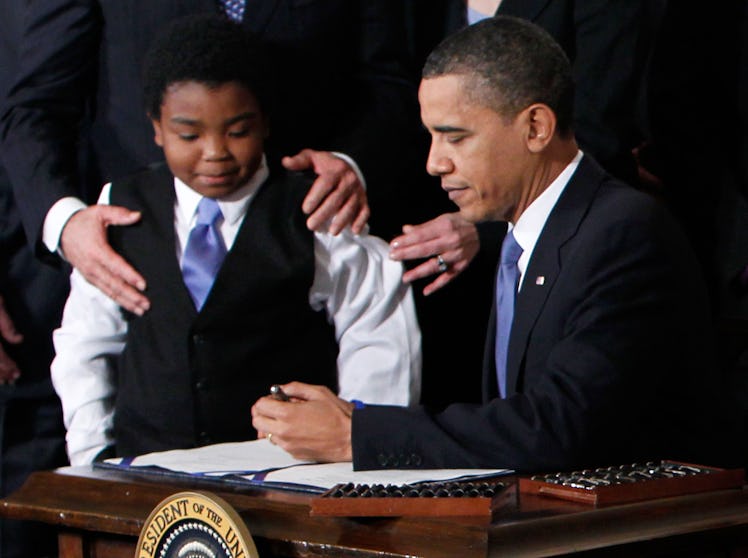
The Tax Bill Doesn't Repeal Obamacare, But It Takes Away A Major Feature
As a Republican tax reform bill makes its way through Congress, all the way to President Donald Trump's desk, a huge part of his predecessor's signature law is on its way out of the window. No, the tax bill does not repeal Obamacare — otherwise known as the Affordable Care Act — but the bill does take away the heart of former President Barack Obama's health care law. Pending the passage of the tax bill, Obamacare's individual mandate will no longer exist, because the tax bill includes a repeal of the mandate.
Repealing the mandate has major implications for the health care market and for young people in particular. The repeal means that people who do not sign up for health care will no longer face a penalty when it's time to pay their taxes. The individual mandate is important to Obamacare because the penalty essentially forced young and healthy people — who, in theory, don't incur many costs to companies that provide them coverage — to pay for health insurance.
One health care expert, Kaiser Health News' Julie Rovner, broke down the significance of the mandate for NPR. "Insurance said when the Affordable Care Act was passed, that if you're going to require us to accept sick people and not to charge them more, you're going to have to have some way to get more healthy people into the pool," Rovner said. "That's what this mandate penalty was about."
The idea is that the money coming from these young and healthy people in turn helps offset the costs of covering health care recipients who use their insurance more often, like those with pre-conditions, for whom Obamacare was good.
Without the mandate, Obamacare is expected to suffer for a couple of reasons that experts have predicted. First is the fact that without a mandate, the costs for signing up for health insurance are expected to go up, since insurance companies will have reason to anticipate that there will be fewer business coming their way via people who were prompted by the mandate into joining an Obamacare plan. Plus, if costs do indeed rise, there's no longer a mandate that forces older people to sign up for the plans, so some might choose to keep money in their pockets rather than sign up for Obamacare.
"But there is a concern that if you take it away and don't replace it with anything — and at the moment there is no replacement in this bill — that literally only sick people will buy insurance," Rovner told NPR. "The only response for insurers at that point is either to raise premiums dramatically or to drop out altogether."
The first version of the GOP tax bill — a version that came from Republicans in the House of Representatives — did not include a repeal of the individual mandate. However, once the House bill passed, which then triggered the Senate GOP to begin negotiation on a tax bill, the Senate made its own version, which included the mandate repeal.
Because the Senate and House versions of the GOP's tax reform bills were so different, the two chambers had to put together what's called a conference committee, which settled the differences between the two bills in order come to an agreement on one final game plan and one final bill.
During the course of the conference committee negotiations, Republicans could have decided to leave out an individual mandate repeal. However, the House agreed to include an individual mandate, like the Senate, which brings us to this point.
The GOP's tax reform efforts are on the verge of passing on Tuesday, Dec. 19. If and when the bill does get signed, it will deal a major blow to Obamacare.